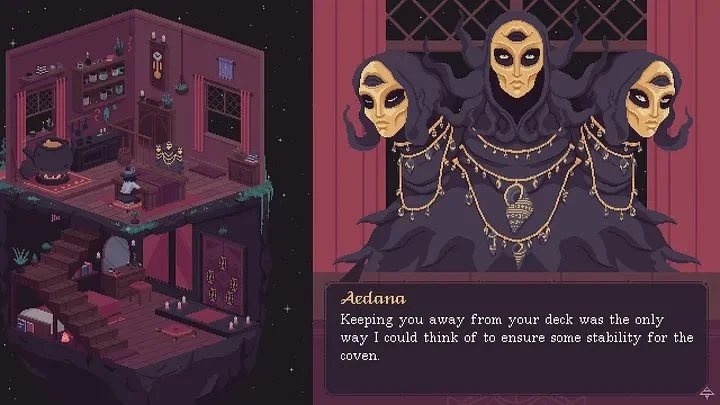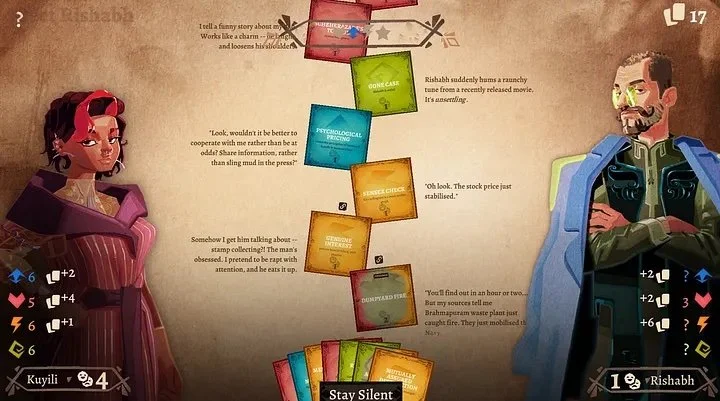Change makers don’t understand games; game makers don’t understand change
Policy makers, researchers and activists don’t really leave their own realities to visit the crazy multiverse of gaming. At the same time, game developers often think sustainability is about trowing plastic bottles in the recycling or about putting windmills in a grid. We need to bridge this divide if games are going to mean something for our collective futures. Change makers and game developers need to actually step into each other’s worlds.
IMMORTALITY is not what most people would think of when they think of video games. Image: Whynow gaming.
Having worked as a researcher on games and better futures for a number years in Anticiplay and now in STRATEGIES, I find myself moving between two realities. The one reality is that of policy makers and researchers who want to use games for social impact on issues like sustainability. The other reality is the game industry, where people want to make good games, driven by a mix of commercial and artistic ambitions.
There is a pretty huge rift between these two worlds.
In the world of sustainability and social change, there seem to be many people in policy, activism and research who are ‘game-curious’. I get at least one email a day asking about making a game to make topic x more interesting and interactive. My sense is that these messages are coming from people who follow the classic ‘chocolate covered broccoli’ line of thinking: Games are a way to add a layer of fun to something boring and complex. As a result, there is a cottage industry of ‘serious games’ and ‘simulation games’ — endless small projects that offer a gamification of serious issues. Some of these are pretty good! But many of them also would not be played voluntarily outside of a classroom or workshop setting.
Then there’s the world of commercial games. The biggest global medium by far. This is a world where games can be cynically produced mass media. But they can also be art, and insane passion. It’s a world where strange realities, complicated personal stories, dumb, shallow garbage and crazy addictions vie for the consumer’s attention. Games can be dreams and nightmares, life-long obsessions, and the object of profoundly fanatical and stupid culture wars. They can be massive bloated piles of hybris and hopeless hobby projects.
In the world of sustainability and social change, I have the sense that people really don’t get games. Maybe they play board games, which is valuable experience. But if they’re interested in funding or helping to produce video games, I think change makers are often handicapped by having very limited experience. They don’t know that games are more than Mario, Call of Duty, or Sim City, or maybe their kids playing Fortnite. They don’t know about IMMORTALITY, or Before Your Eyes, or Into the Breach, or Inscryption, or The Stanley Parable, or Bayonetta, or Divinity: Original Sin, or Dwarf Fortress, or Tyranny, or What Remains of Edith Finch, or Wolfenstein: The New Colossus, or Cosmic Wheel Sisterhood, or — you get my point.
Everyone play The Cosmic Wheel Sisterhood. It’s amazing.
Change makers don’t know what is possible with games. And so they don’t know what games to support or help make.
On the other hand, people in the games industry often struggle to engage with societal issues, and sustainability in particular, in a way that is multidimensional. In a way that touches on the politics, the human suffering, the meaning crisis, the deep structural injustices, the small stories, the joy of caring for ecosystems.
This is interesting though, because it means that when change makers and game designers don’t get to know each other’s worlds, they may end up with shallow games that don’t do much to shake up the status quo. I have some reflections for both sides of this dynamic.
Change makers: understand that games are artistic expressions and that people love them
I believe that change makers, policy makers and funders interested in games as a medium of societal change should recognize that games are artistic expressions that resonate with their players. Games that are not made with passion and dedication are likely to fall flat. Some of the most successful and best games that reflect on the human complexity of the planetary crisis and that resonate deeply with players on this topic are very much their creators’ expressions. Blog favorite Disco Elysium explodes with personal expression and opinions about everything including the meaning crisis. Citizen Sleeperis a very personal meditation by Gareth Damian Martin and their team on community in the ruins of capitalism, directly inspired by Anna Tsing’s Mushroom at the End of the World. No one told these people to make a game that teaches some specific bit of awareness. And the scale of their ability to connect deeply to players far eclipses that of most educational games.
The Dutch Games Garden leads many efforts to build the Utrecht and Dutch games sector, such as the Dutch Games Monitor.
I think there’s a lesson here for how we fund games in the context of social impact. For years, one of the most exciting things about working on the space of games in Utrecht has been that we share the city with the Dutch Game Garden. The DGG is an incubator for independent game developers. They’ve helped over 230 game studios, incubating their businesses through expert advice, with housing and infrastructure, through events and matchmaking with other parties. But the Dutch Game Garden is under increasing pressure by its funders to exclusively support game developers who make games for specific social impacts, rather than supporting studios that make good games in a more general sense, with the social impact games being part of the activity. I think this is a mistake.
Of course there should be funding available to work on specific societal topics through games. But I would be very supportive funders and policy makers taking a more open stance, and encouraging conversations with game developers about the issues they care about. Rather than giving them an assignment, to ask — what are they interested in expressing through their games? I think that if policy makers, funders and other change makers cede some control to game developers, the possibilities for unexpected, exciting and deeply resonant games increase.
Game developers: understand that societal change involves entire worlds of rich experience
I teach a yearly class that brings together game development students at the Utrecht School of the Arts (HKU) with sustainability-oriented students from Utrecht University. As the class starts, our first mission (and running joke) between the UU and HKU teachers is to avoid the one game that students always want to make, at least initially: something with a title like ‘My Little Planet’ that is just a small, cute planet that has you in the role of a technocratic manager solving the sustainability crisis as if there are no politics involved. My Little Planet, Our Tiny Planet, My Tiny Sustainability, we’ve seen them all. One of these games is arguably really fine. But we don’t need sixty. The key strategic logics in these kinds of game concepts are also often quite telling: you make trade-offs between short-term profit and long-term sustainability. You have to balance ‘environmental’ meters with ‘happiness’ meters. And so on.
But the students are game developers and artists, and haven’t been trained in sustainability issues. Where would they learn about anything outside of this rather narrow, modernist, capitalist and technocratic view is what society shows sustainability to be? They are, luckily, quick and critical learners. A course like the one that HKU offers is a good way to break open the possibility space.
There is some excellent work going on outside of game design education as well to help game developers work on climate change and other sustainability issues. Friend of the project Arnaud Fayolle (Ubisoft Positive Play) has been developing excellent guidelines for integrating climate change into game design in effective ways. The International Game Developers’ Alliance Climate Special Interest Group has developed a number of resources for climate-focused game developers as well. The UN initiative Playing for the Planet works to integrate sustainability concerns into mainstream games.
Game designers and activists joining forces
A way to break the technocratic focus on sustainability games is to have game developers team up with people who are directly in the actual fight for the future. Gaslit (such a good name) is a game developed by a team of HKU students in collaboration with Fossielvrij. Fossielvrij is an activist group from the Netherlands who have been responsible for some of the most impactful actions in recent years in terms of climate change — successfully pressuring one of the world’s biggest pension funds, ABP into divesting their 15 billion euros of investments from fossil fuels. In Gaslit, you help local communities fight the gas industry and their LNG terminals in a mix of puzzle and grid/environment management. The game reminded me of Terra Nil, not just because of the game play, but also because of the vibe. I understand from my friends at Fossielvrij that they gave the game development team a lot of freedom to play with their thematic focus — and that the team wanted to capture a vibe of encroaching LNG infrastructure more than anything. I’ve written before about Terra Nil, not being uniformly positive about the ways it simplifies dealing with environmental issues, but pointing out that the vibe of caring and nurturing for environments really sold the game for me. With Gaslit, the vibe is different, more messy, more political. I think it’s a great prototype and a nice example of what happens when actual game designers work with actual activists.
Fossielvrij’s amazing work has, as many of you know by now, inspired the game we are building as well. All Rise is a strategic, story-based role playing game in which you play as a scrappy team full of big personalities that takes fossil fuel giants to court. We are working with some of the top people in the games industry — see for instance this wonderful Guardian interview about games and politics with our narrative designer Meghna Jayanth. One of the most exciting things for this team is that next to drawing inspiration from other games (such as Ace Attorney, Disco Elysium, and card games like Slay the Spire) we are drawing directly from the rich experiences of activists. Our first chapter is set in a fictional version of southern India, and it has been a real joy for the team to speak to and hear about the experiences of activists there and elsewhere in the world.
All Rise: Kuyili takes on Rishabh in a narrative card battle that is all about getting under this fossil exec’s skin
For us, this is really turning the core logic of games about climate and sustainability on its head. Instead of ‘gamifiying’ a boring, technocratic approach to sustainability, we really see the lived experience of people fighting with everything they have against very powerful forces as a rich and epic story that begs to be made accessible through game play. While developing this game, we are interested in highlighting the weirdness and the joys of climate activism as well as the drama, the anger and the sadness. We are massively enjoying the process that happens when game developers, researchers and activists come together to consider how to translate this crazy reality into an exciting, challenging and subversive game.
Core to our design philosophy is that deep seriousness and deep playfulness are not opposites, but complementary paths into the complexity of societal change. I think that change makers and game makers should explore these depths together.
A few final thoughts that also serve as action points, also for Anticiplay and STRATEGIES:
· I think it would be so much fun and so valuable to do trainings with policy makers and funders around games literacy. Let’s have days where we try out lots of games together so everyone has a better frame of reference when it comes to games and what is possible. Let’s start a games book club for policy makers.
· For a while we have been discussing and plotting to bring game developers and other game industry folks into climate activism. We can use their creativity, of course, but we also want to expose them to the rich realities of this type of social change. It’s scary, it’s challenging, it’s fun, it’s being together.
· We really need to highlight the potential of games that are occupying that special space where they are commercially attractive, artistically powerful AND societally relevant. Let’s discuss the infrastructures needed to help grow that space for games.




